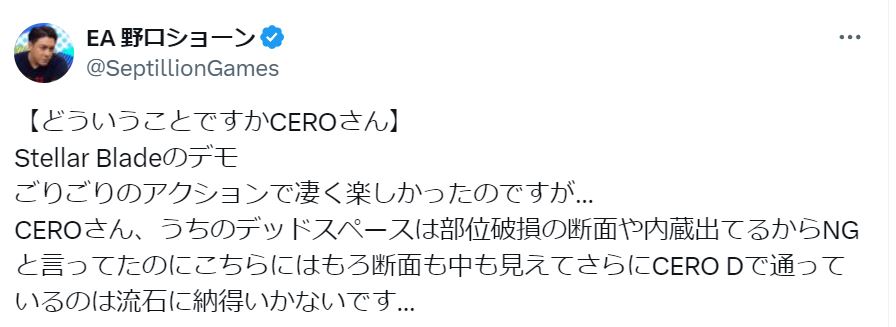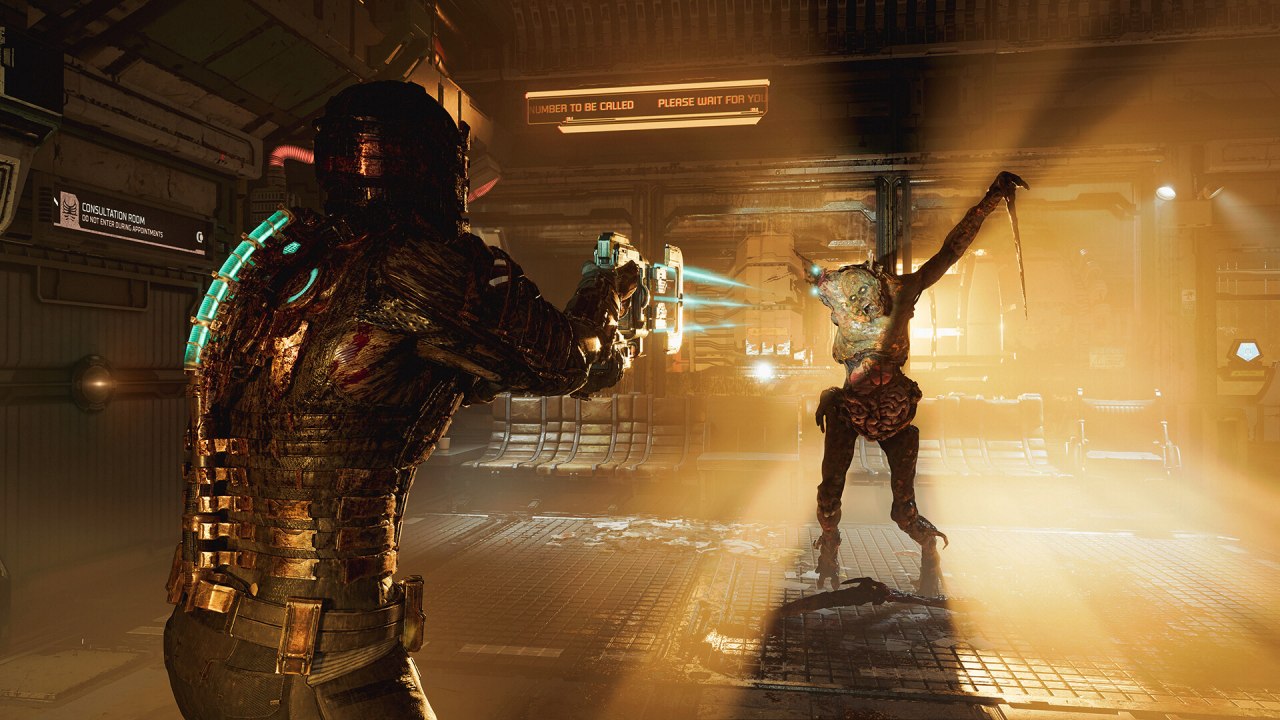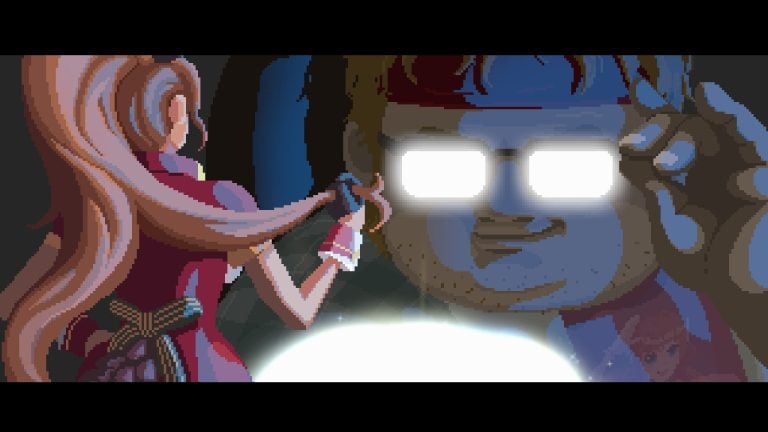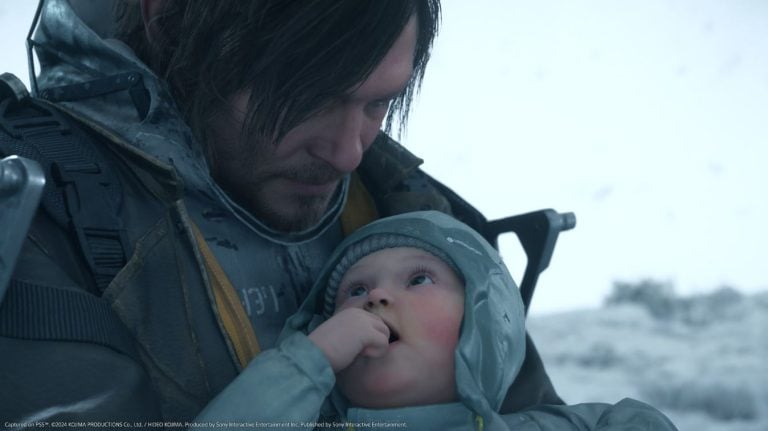Shift Up’s Stellar Blade is scheduled to launch on April 26. With the release date approaching, the Stellar Blade official X account has announced that the game will be uncensored in all regions, including Japan. Stellar Blade will be released in Japan with a CERO D (17+) rating and no content restrictions – a decision that has raised questions among industry professionals about the CERO rating system’s consistency.
While Stellar Blade’s Japan release has earned a 17+ rating with content descriptors for Sexual Content and Violence, it appears the game will be released without any censorship. The game’s sexual aspects, such as the heroine’s carefully crafted rear view and provocative costumes, have been talked about ever since the game was announced, but Stellar Blade also includes some rather gory depictions (as far as the demo reveals). For example, one cutscene depicts the cross-section of a character’s severed arm, and mangled bodies of humanoid enemies can also be spotted.

The disparity between Stellar Blade’s gore and its CERO D rating has prompted a response from Electronic Arts Japan’s General Manager Shaun Noguchi. While Noguchi offers nothing but praise for Stellar Blade itself (even encouraging people to buy it), he questions the CERO rating system and its apparent inconsistency. He mentions that EA’s Dead Space (released in January 2023) was denied a CERO rating due to “depictions of cross-sections of severed body parts and internal organs.” As video games cannot be released on consoles (physically) in Japan without a CERO rating, the initially planned console releases of Dead Space were cancelled, and the game could only be released on PC in the country.
Noguchi’s words indicate that Dead Space was not even eligible for a CERO Z (18+) rating, while Stellar Blade received the lower CERO D rating even though it contains depictions similar to what Dead Space was rejected for. Again, Noguchi stresses that he has no intention to criticize Stellar Blade, but rather to express his dissatisfaction with Japan’s ambiguous rating process for console games.
As mentioned previously, console games in Japan can only be released after having been reviewed and assigned a rating by the appropriate organization. For physical releases, publishers are more or less obligated to request a review from the Japan-based CERO. For digital-only titles, publishers also have the option of requesting a rating from the overseas-based IARC, but there are exceptions.

Starting March 2022, the Japanese PlayStation Store started accepting IARC ratings in addition to the existing CERO ratings for digital-only releases (Related article). On the other hand, titles intended for ages 18 and older still require a CERO rating. In other words, SIE still requires the acquisition of a CERO rating for physical and digital sales of games that are rated 18 or older under the IARC generic rating.
As was the case with the previously mentioned Dead Space, CERO rating-related troubles have led to publishers making big changes to their sales plans. One example is the 2022 sci-fi horror The Callisto Protocol, which had its Japanese release cancelled for failing to obtain a CERO rating (Related article). The title never made it to consoles or PC in Japan.
Under current circumstances, distributors can be forced to change their plans drastically or cancel a release entirely depending on CERO’s decision, especially if their game contains some form of explicit content. In his thread on X, Noguchi comments that many titles have been victims of CERO’s “vague” review process. He hopes for the introduction of a more transparent system and criteria, such as a checklist or point system.

According to CERO’s official website, their reviewers are recruited from the general public and consist of men and women in their 20s to 60s from various occupations. After undergoing training by CERO, they examine content based on a list of 27 items subject to review. Each item on the list has its upper limit, and depictions that exceed the tolerated range are designated as “banned expressions.” Games found to contain banned expressions are denied a CERO rating. Based on what Noguchi is saying, it seems CERO does not communicate clearly to manufacturers about what exactly these upper limits are, resulting in an ambiguous rating process.
Sellar Blade is scheduled to be released on April 26 for the PS5.
Written by. Amber V based on the original article on Automaton Japan (original article’s publication date: 2024-04-22 11:45).






Can agree on the CERO ratings being too vague and not clear with violence or fanservice elements as well in each category and no sliding scale for interpretation which leads to censorship of re-released products and can lead to cancelations as a whole.
In my personal view they are really more strict than the ESRB rating in America. Unless it’s Outright Porn and/or Extreme Gore throughout America does not try to give AO at all. Over here M would be for ecchi and normal Gore. T is Suggestive fanservice elements or implied violence. E would be just a kids game. It’s simple and easy to understand for any ordinary person. CERO needs to to be less strict on both violence and on fanservice, to also be respectful to re-releases and remasters as well.